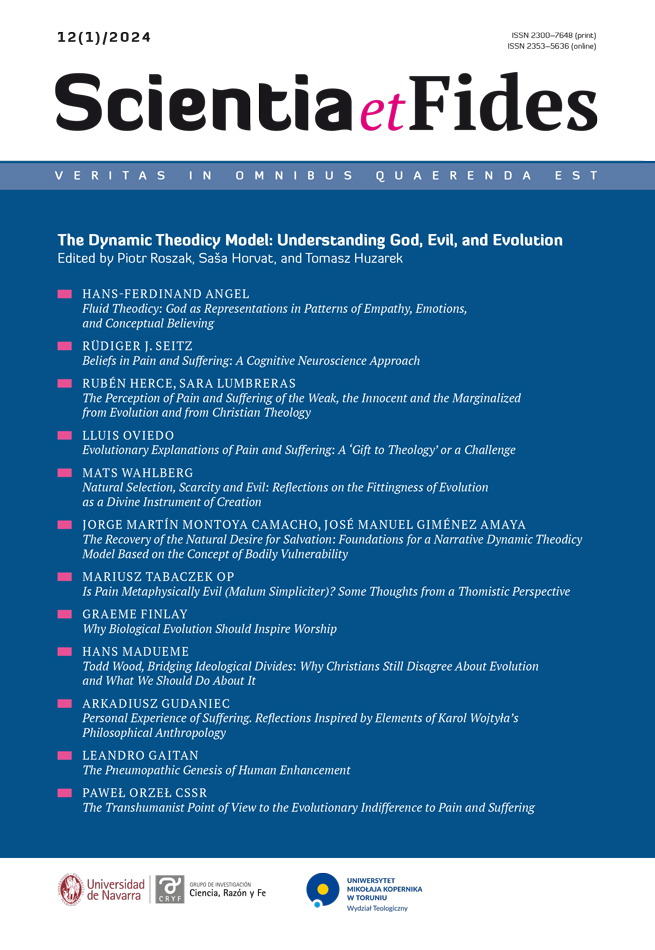The Pneumopathic Genesis of Human Enhancement
DOI:
https://doi.org/10.12775/SetF.2024.011Keywords
transhumanism, achievement-subject, pneumopathology, Byung-Chul Han, Eric VoegelinAbstract
The philosopher Byung-Chul Han affirms that the present age reduces the human being to a performance-machine, and that, because of this reduction, the type of disease that characterizes it this age is neuronal. In the present article, I argue that Han’s analysis is correct but incomplete. Behind this reductionism, which leads to neuropathologies of different types, lies another type of pathology that the philosopher Eric Voegelin calls ‘pneumopathology’—disease of the spirit. The transhumanist view of human enhancement deepens this reduction and shows that the pneumopathology that blights today’s society is in a process of unprecedented chronification. To justify this thesis, I first explain the connection between human enhancement and the achievement imperative denounced by Han; I then analyze the Voegelian category of pneumopathology to show its value for an ontological-historical understanding of human enhancement.
References
Asla, Mariano. 2021. “El transhumanismo me quita el sueño: Una apología filosófica del dormir.” In Ciencia y filosofía: estudios en homenaje a Juan Arana, edited by J. J. Padial & F. Rodríguez Valls, Vol. I, 81–89. Themata.
Bostrom, Nick. 2003. The Transhumanist FAQ. A general introduction. Version 2.1. WTA. www.transhumanism.org/resources/FAQv21.pdf.
Canton, James. 2004. “Designing the future: NBIC technologies and human performance enhancement.” Annals of the New York Academy of Sciences 1013: 186–98. https://doi.org/10.1196/annals.1305.010.
Donati, Pierpaolo. 2019. “The dream of transcending the human through the digital matrix: A relational critique.” Scientia et Fides 7(2): 171–93. http://dx.doi.org/10.12775/SetF.2019.022.
Franz, Michael. 1992. Eric Voegelin and the politics of spiritual revolt: The roots of modern ideology. Louisiana University Press.
Gaitán, Leandro. 2019. “Heaven on Earth: The Mind Uploading Project as Secular Eschatology.” Theology and Science 17(3): 403–416. https://doi.org/10.1080/14746700.2019.1632554.
Gaitán, Leandro. 2021. “The commodification of personality: human enhancement and market society.” Human Affairs 31(1): 40–45. https://doi.org/10.1515/humaff-2021-0003.
Garasic, Mirko. 2012. “Human enhancement in the EU.” Australian and New Zealand Journal of European Studies 4: 31–41.
Gray, John. 2004. Heresies: Against progress and other illusions. Granta Books.
Han, Byung-Chul. 2015. The burnout society. Stanford University Press.
Han, Byung-Chul. 2017. Psychopolitics: Neoliberalism and new technologies of power. Verso.
Hottois, Gilbert. 2013. “Humanismo, Transhumanismo, Posthumanismo.” Revista Colombiana de Bioética 8: 167–92.
Huberman, Jenny. 2021. Transhumanism: From ancestors to avatars. Cambridge University Press.
Hughes, Glenn. 1993. Mystery and myth in the philosophy of Eric Voegelin. University of Missouri Press.
Istvan, Zoltan. 2016. “Let’s cure the disease of sleeping: Sleeping is probably the most wasteful thing all humans do.” Vice, https://www.vice.com/en/article/aekgd5/lets-cure-the-disease-of-sleeping.
Koch, Tom. 2010. “Enhancing who? Enhancing what? Ethics, bioethics, and transhumanism.” Journal of Medicine and Philosophy 35: 685–99. https://doi.org/10.1093/jmp/jhq051.
Kurzweil, Raymond. 1999. The age of spiritual machines. Orion.
Levinas, Emmanuel. 1971. Totalité et infini. Essai sur l’extériorité. Nijhoff.
Moravec, Hans. 1988. Mind children: The future of robot and human intelligence. Harvard University Press.
More, Max. 2013. “The philosophy of transhumanism.” In The transhumanist reader: Classical and contemporary essays on the science, technology, and philosophy of the human future, edited by M. More & N. Vita-More, 3–17. Wiley-Blackwell.
Parotto, Giuliana. 2018. “The reality of myth and the myth of reality.” Philosophy and Public Issues 8: 119–36.
Pearce, David. 1995. The hedonistic imperative. https://www.hedweb.com/hedethic/hedonist.htm#0
Rothblatt, Martine. 2013. “Mind is deeper than matter: Transgenderism, transhumanism, and the freedom of form.” In The transhumanist reader: Classical and contemporary essays on the science, technology, and philosophy of the human future, edited by M. More & N. Vita-More, 317–26. Wiley-Blackwell.
Rothblatt, Martine. 2014. Virtually human: The promise and the peril of digital immortality. St. Martin’s Press.
Savulescu, Julian. 2009. “The human prejudice and the moral status of enhanced beings: What do we owe the gods?” In Human enhancement, edited by J. Savulescu & N. Bostrom, 211–47. Oxford University Press.
Scharre, Paul, & Fish, Lauren. 2018. “Human performance enhancement.” Center for a New American Security 1–17. https://www.jstor.org/stable/resrep20411.
Voegelin, Eric. 1990. Anamnesis. University of Missouri Press.
Voegelin, Eric. 1999. “Hitler and the Germans.” In The Collected Works of Eric Voegelin. Vol. 31. University of Missouri Press.
Voegelin, Eric. 2006. “Autobiographical reflections.” In The Collected Works of Eric Voegelin. Vol. 34. University of Missouri Press.
Wolbring, Gregor. 2008. “Why NBIC? Why human performance enhancement?” Innovation: The European Journal of Social Science Research 21: 25–40. https://doi.org/10.1080/13511610802002189.
Wolbring, Gregor. 2009. “What next for the human species? Human performance enhancement, ableism and pluralism.” Development Dialogue 2: 141–61.
Downloads
Published
How to Cite
Issue
Section
License
Copyright (c) 2024 Leandro Martin Gaitán

This work is licensed under a Creative Commons Attribution-NoDerivatives 4.0 International License.
CC BY ND 4.0. The Creator/Contributor is the Licensor, who grants the Licensee a non-exclusive license to use the Work on the fields indicated in the License Agreement.
- The Licensor grants the Licensee a non-exclusive license to use the Work/related rights item specified in § 1 within the following fields: a) recording of Work/related rights item; b) reproduction (multiplication) of Work/related rights item in print and digital technology (e-book, audiobook); c) placing the copies of the multiplied Work/related rights item on the market; d) entering the Work/related rights item to computer memory; e) distribution of the work in electronic version in the open access form on the basis of Creative Commons license (CC BY-ND 3.0) via the digital platform of the Nicolaus Copernicus University Press and file repository of the Nicolaus Copernicus University.
- Usage of the recorded Work by the Licensee within the above fields is not restricted by time, numbers or territory.
- The Licensor grants the license for the Work/related rights item to the Licensee free of charge and for an unspecified period of time.
FULL TEXT License Agreement
Stats
Number of views and downloads: 752
Number of citations: 0



